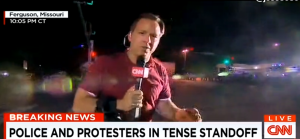CNN Attempts Actual Journalism–But Reverts to Embedded Reporting

Jake Tapper in unembedded mode. (Screen shot by http://noarmycanstopanidea.com/ )
Watching coverage of the unrest in Ferguson on CNN last night (8/18/14), I was struck at the actual journalism I was treated to byCNN‘s Jake Tapper.
It’s not every day corporate media is awestruck by the heavy-handedness of a militarized attack on civilians on US soil. But such was the case for Tapper, who was nearly hit by a tear gas canister fired by police.
Things escalated to the point where Tapper began to legitimately question the police’s actions. His assertion that the over-the-top show of force by Ferguson police ” doesn’t make any sense” was a reasonable assessment for anyone watching the live coverage.
It didn’t last long.
CNN, whose headquarters in Atlanta were the site of protests related to the police killing of Michael Brown and the images the network uses of black victims, was ushered from the streets by police as they moved in on the remaining protesters later on through the night. Tapper, now joined by Don “Pull Your Pants Up” Lemon, did manage to speak to Captain Ron Johnson of the Missouri Highway Patrol after an awkward on-air phone conversation, where they asked him to meet him “next to the tank.”
Lemon, one of media’s most vocal proponents of “responsibility politics” (Extra!, 11/13), asked Johnson what was “bothering” him–as the conversation moved from one of journalists questioning officials, to one with a markedly more personal and empathetic tone. Johnson proceeded to give the predictable police side of the story that is par for the course with protest coverage. He also admonished Tapper and Lemon for their…well, journalism. Johnson didn’t think Ferguson police were getting positive enough coverage, so he asked Tapper and Lemon to join him the next day and report alongside him.
They eagerly agreed.
In a matter of minutes, members of the media, who had been objectively and effectively reporting on a protest greeted with a militarized crackdown worthy of a war-torn country, suddenly agreed to become embedded journalists–just like in a war-torn country. Embedded journalism, as FAIR has often written (e.g, Extra!, 9/03), is one of the worst practices of media if you want independent and accurate reporting.
The next day, in a much less tense environment, Johnson continued to make his case as he spoke with Lemon (CNN, 8/19/14) that police were “getting a bad rap” by the media.
I guess no one should be that surprised. These moments of actual journalism where the plight of communities of color is taken into account are the exception and not the rule with corporate media.

